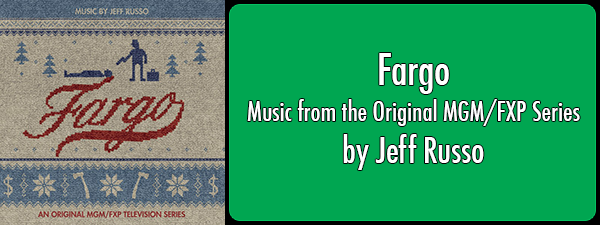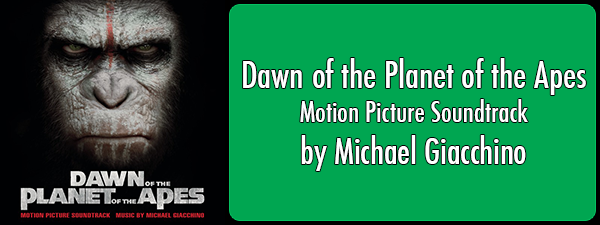In the fifth installment of CHUD’s soundtrack review column, we’ve got a Minnesotan tragedy and a lot of ape-themed puns. Which soundtracks should you be adding to your collection? Read on to find out!

Who composed it?: Jeff Russo
Who released it?: Sony Masterworks
Who’s it for?: Inept salesmen and pregnant police officers
What’s the Lowdown?: So you’re Jeff Russo. You’ve scored a lot of TV, but you also play guitar in the band Tonic. One day, you get a call. The voice on the phone (perhaps it belongs to Noah Hawley) asks you to work on a new series based on a Coen brothers masterpiece. A masterpiece with an iconic score by Carter Burwell. How could you say no? How do you not sweat bullets? Carter Burwell’s score for Fargo runs the emotional gamut from bleak to epic to whimsical to weird, just like its accompanying film. So how does one even begin to follow it up? Do you emulate at the risk of sounding like a knockoff, or do you innovate at the risk of losing continuity of tone?
For starters, you emulate. There’s no shame in saying that Jeff Russo’s main theme for the show (Bemidji, MN) sounds a lot like the opening cue from Carter Burwell’s original score. Burwell’s score more openly quotes traditional Scandinavian fiddle music, but both cues feature similarly memorable melodies played on solo violin, both feature harp and sleigh bells, and both eventually evolve into really grand, epic cues that restate the main theme with the full orchestra. But after that (admittedly solid) bit of emulation, you innovate. You redefine. You explore. That’s what makes Jeff Russo’s Fargo score really good.
In terms of innovations, Russo is a bit more contemporary with his compositions. He’s not afraid to layer in some cold, haunting synths alongside the 45-piece orchestra (the Prague Philharmonic). He uses synths sparingly in Fargo, which I think is appropriate given the tone and texture of the show. On Wrench and Numbers, Russo goes full-on rock drummer: a punchy drum kit blasts out a funky beat. It’s the only thing in the whole cue, but it creates such a distinct introduction to the sign language-savvy Mr. Wrench and Mr. Numbers that it might be the best use of percussion in the whole score.
So while there’s no question that Burwell’s work influenced the score for the FX series, Russo manages to make Fargo his own by creating new themes are sure to stick in your head after watching the show’s exquisite ten-episode run. The soundtrack album features a selection of tracks from the first season, and there’s not a single one I can call bad. It’s a very rewarding album to hear from start to finish. As far as I know, Fargo has yet to be renewed for a second season, but it’s rumored that we’ll see another season featuring entirely different characters, settings, and situations. I just hope they bring back Jeff Russo.
The soundtrack album is available right now on Amazon on CD or in MP3 format. Get you some.
Standout Tracks:
- Bemidji, MN
- Wrench and Numbers
- Stavros’ Prayer
- The Parable (Gus’ Theme)
- Poor Demitri
- Gus and Molly

Who composed it?: Michael Giacchino
Who released it?: Sony Masterworks
Who’s it for?: Apes who cried during the first ten minutes of Pixar’s Up.
What’s the Lowdown?: Musically, Planet of the Apes set one hell of a precedent. In an episode of Trailers from Hell, John Landis describes Jerry Goldsmith’s score as scary, and I completely understand why. Goldsmith’s most famous cue from that score is called The Hunt, and it’s rich with dissonance, tension, and lightning-fast piano work that still makes my hair stand on end. Jerry Goldsmith lent gravitas to something that could be seen as goofy, particularly by contemporary audiences. Luckily, Apes holds up because it’s a genuine classic; a film that manages its tone exceptionally well. Hell, it did most things exceptionally well. But based on Nick’s review of Dawn of the Planet of the Apes, it looks like we’ve got a new contender for the best film in the franchise.
One of Michael Giacchino’s goals in scoring Dawn was to honor Goldsmith’s original sound, while finding interesting and unique sounds of his own. While I don’t think I would describe Giacchino’s score as terribly unique, it is quite good, and like Landis says about Goldsmith’s original score, it’s scary. I mean genuinely frightening. There are several cues (Look Who’s Stalking, Lost City of Chimpanzee, Gorilla Warfare) that evoke the primal terror of Györgi Ligeti’s Requiem, used most famously during the apes/monolith scene in Kubrick’s 2001. I’m sure the juxtaposition of that sound against ape imagery was not unintentional in Matt Reeves’ Dawn.
The album doesn’t show any sign of lightening up until the third track, The Great Ape Processional, in which we hear the first strains of the Giacchino’s moving “family” theme (I haven’t yet seen the movie, so I don’t know exactly what I should call this theme). Past Their Primates continues this trend of softer cues. It’s stereotypical Giacchino, keeping things simple with an arpeggiated countermelody. It evokes his work on Let Me In and Super 8, which isn’t a bad thing, just kind of expected. That’s not really a negative thing if you’re a good composer, and I certainly believe Giacchino fits that description.
The one motif you’ll hear most often on the soundtrack is a “sinister” motif, and I don’t yet know if it’s associated with apes or humans (I suspect it’s apes), but it’s a short, oft-repeated motif that you’ll find on the tracks Close Encounters of the Furred Kind, Monkey to the City, Along Simian Lines, and my favorite track on the album: Monkey See, Monkey Coup. Christ, I need a whiskey after all these puns.
The one wild card on the album was the use of xylophone during action cues, which feels oddly appropriate for this film, but it’s an instrument that’s fallen out of vogue in contemporary scores. One wouldn’t typically associate the bright, pinging sound of the xylophone with a film as dark as Dawn of the Planet of the Apes. The album’s strangest use of xylophone appears in Along Simian Lines, which features a call-and-answer between the xylophone and upper woodwinds. It’s a little silly, given the bleak and frightening tone we hear in many of the tracks.
It looks like Matt Reeves is already coming back for another Apes film, and I have no doubt that his frequent collaborator Michael Giacchino will be back, too. That’s going to be fun, because we might get to hear some of these themes again, and perhaps they’ll have evolved, much like this film franchise has.
Dawn of the Planet of the Apes (Original Motion Picture Soundtrack) is available right now via Amazon MP3, and will get a CD release on August 12.
Standout Tracks:
- Level Plaguing Field
- Look Who’s Stalking
- Close Encounters of the Furred Kind
- Monkey See, Monkey Coup
- Planet of the End Credits